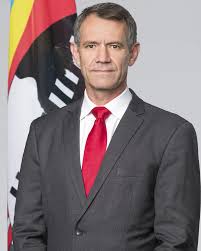By Delisa Thwala
The Minister of Finance Neal Rijkenberg has encouraged all emaSwati to diligently declare their goods at the border gate as it helps with Eswatini’s SACU receipts.
The Minister was speaking in his latest video blog on the Government’s page under the Ministry of Finance, he said declaring the goods at the border means Eswatini can register for SACU receipts.
“Declare everything you have bought at the border. It benefits Eswatini in two ways, Eswatini can collect its VAT from South Africa. We have more money, which means we can register for SACU recipients,” said the Minister.
Worth mentioning is that SACU consists of Botswana, Lesotho, Namibia, South Africa, and Eswatini. All customs, excise, and additional duties (trade taxes) collected in the SACU common customs area are paid into the common revenue pool and shared among member States.
Member States’ pool share is disbursed or determined under the SACU agreement’s revenue-sharing formula.
The current revenue-sharing formula has three components: the Customs Component, the Excise Component, and the Development Component.
RELATED: Eswatini Economy is stable to start a business- Minister of Finance
The Customs share is allocated based on each country’s share of intra-SACU imports.
On January 12, 2024, Minister of Finance Neal Rijkenberg said of the E13.06 billion, E1.8 billion was surplus revenue collections emanating from the 2022/2023 financial year,
while the E11.26 billion was based on the projected common revenue pool projection for 2024/2025, which had grown by 6.6 per cent from the 2023/2024 level.

He explained that some of the factors that led to the increase were that Eswatini’s imports from SACU, during the year under review, increased by 25.24 per cent, compared to the previous year.
The minister said the increase was a good indication of the economy and economic growth. Rijkenberg added that part of the receipts would be directed to the Revenue Stabilisation Fund.
This fund was established to reduce the country’s overreliance on SACU receipts. The money came at a reasonable time, as the government is in a tight spot financially, given that suppliers and service providers are owed about E1.4 billion.
This resulted in the government prioritizing its responsibilities, which entail rendering services to its various portfolios. It is a documented fact that the government has in recent months, invested a large chunk of its resources in resuscitating the public health sector.
RELATED: Pakistan’s target of 3.5% GDP in 2023-24 fiscal year “realistic” – finance minister
As such, the Ministry of Finance has reported to have spent over E270 million in the past six months, to pay for the procurement of medical drugs and supplies.
This resulted in the administration accumulating arrears with its service providers and suppliers, which amounted to E1.4 billion. This was although in January 2024, the country had cleared arrears of about E700 million from SACU receipts of about E2.9 billion, which were received in this period.
Some of the debts, which had been accumulated by the government over the past months, include rentals for houses leased from citizens, which are then allocated to civil servants due to the shortage of infrastructure.
The debts also include service providers, such as utility entities like Eswatini Electricity Company (EEC), Eswatini Posts and Telecommunications Corporation (EPTC) and Eswatini Water Services Corporation (EWSC).

